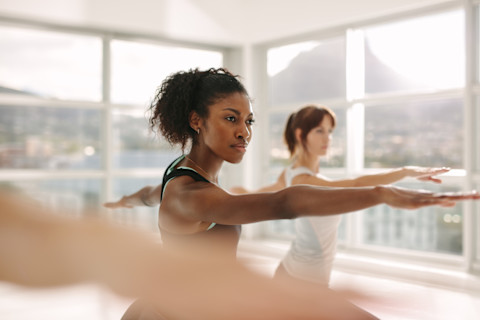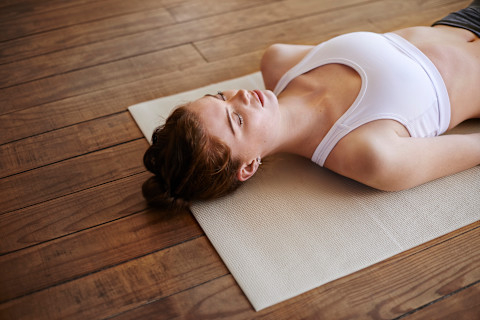An N.D.'s Top 20 (Science-Backed) Ways To Treat Anxiety Naturally

As a women’s health expert who helps women balance their hormones naturally, I see that mental health issues are common concerns among many of the patients who meet with me. In fact, women are twice as likely1 to suffer from depression when compared to men, and anxiety is common enough that odds are you know someone who has dealt with it or maybe is still dealing with it. And maybe that someone is you. If it is, know that you're not alone. It's estimated that anxiety affects over 40 million adults in the United States, making it the most commonly diagnosed mood disorder. Out of those 40 million, only about 36.9 percent receive treatment.
The symptoms of anxiety can uproot your life, and they could be a sign of something bigger.
In my clinical experience, I have found that anxiety is one of the many ways your body clues you in to a deeper underlying issue. Anxiety has a root cause, and you deserve to have that investigated. Some of the common causes of anxiety include:
- Hormone imbalances like adrenal fatigue, low progesterone, and thyroid disease
- Metabolic issues, like blood sugar imbalance, diabetes, or inflammation
- Chronic disease like autoimmune disease and heart disease
- Nutrient deficiencies like B12, vitamin D, and magnesium
- Infections2 like viral illness, gut infections, parasites, and Lyme disease
- Medications like hormonal birth control, asthma inhalers, and over-the-counter cold symptom drugs
- Dietary triggers3 like excess caffeine, alcohol, sugar
Healing anxiety naturally means figuring out why you have the symptoms in the first place and addressing the underlying cause. But I believe in offering patients tools to manage their anxiety while further investigating what's going on. Because anxiety is more than just unpleasant; it can and does interfere with our lives. Here’s a list of the top anxiety relief tools my patients have reported success with:
Natural treatments for anxiety.
1. Meditate.
Mindfulness meditation has been shown4 to reduce symptoms of anxiety and panic. And even better, it helps maintain the reduction of symptoms. Aim for five minutes per day, and leverage some of the other recommendations to help you get into a state of calm a little bit quicker.
2. Get to know L-theanine.
L-theanine is an amino acid found in green tea and has been shown5 to reduce symptoms of anxiety and the physiological signs of stress, like high blood pressure. Aim for 200 milligrams once to twice daily for the most benefit.
3. Try lemon balm for anxious thoughts.
Lemon balm is a nervine (a plant remedy that has a beneficial effect upon the nervous system in some way) herb that can be consumed as a tea, taken as a tincture, or in a combination herbal supplement. A special bonus? It smells heavenly.

4. Get your yoga on.
Research studies have shown6 as little as one hour of hatha yoga per week can help promote relaxation and reduce anxiety.
5. Start using vitamin C.
Vitamin C might seem like a surprising suggestion, as most people think it's only important when it comes to the immune system. But vitamin C supports progesterone production, which is a hormone that has a calming effect on the brain.
6. Use lavender to relieve anxiety.
Lavender can help promote a calm state, which makes it a great essential oil to keep on hand. Try smelling lavender before a stressful presentation, when you’re ready for bed, or just before meditation or yoga.
7. Try relaxation training.
Research has consistently shown relaxation training to be effective7 at reducing and managing anxiety. Find a health care practitioner who can teach you this technique and aim to practice daily.
8. Consider CBD or hemp oil for anxiety.
While we are very early in our understanding of the full potential of CBD, there are many8 studies showing promise in using CBD to manage anxiety. You can find the best CBD edibles here.
9. Cut out anxiety-inducing caffeine.
The only way to know if caffeine is a culprit in your anxiety is for you to cut it out. You can always reintroduce it after a couple of weeks to understand how it affects your mood. Try this instead: Swap for decaf green tea, which contains L-theanine.
10. Eliminate sugar.
Humans weren’t meant to eat 66 pounds of sugar a year. Sugar is inflammatory and can lead to blood sugar and hormone imbalance that ultimately drive anxiety.
11. Try doing a sober month.
Alcohol is often used to manage anxiety symptoms, but in reality, it can make them worse. If you’re serious about overcoming anxiety, then ditching alcohol is a crucial step toward your success. So why not try it for a month and see how you feel?
12. Snack!
If your anxiety peaks after skipping a meal or going too long without eating, it may be that you are experiencing hypoglycemia. Try snacking on protein, and make sure each meal includes protein and fat for better blood sugar balance.
13. Check your B12 levels.
B12 is a common nutrient deficiency, especially if you’re adhering to a vegan or vegetarian diet. Consider adding a B-complex to your routine, and give your cells the vitamins they need to function optimally.
14. Try magnesium to calm anxiety in the evening.
This mineral is incredibly important to mental health and women’s health in general. In one study9 it was found that 250 milligrams of magnesium daily reduced PMS-related anxiety. This is also a common deficiency, which is why I’ve seen so many of my patients benefit from taking it.
15. Try kava root.
16. Experiment with valerian root.
While the research is mixed regarding the effectiveness of valerian for anxiety, clinically I have found patients experience reduced11 anxiety and better sleep while taking this herb.
17. Try a passionflower herbal tincture for anxiety symptoms.
As an herbal tincture taken over a two-week period, passionflower has been shown12 to be as effective as anxiety medications—without the unwanted side effects. I generally recommend two droppers three to four times per day or as needed for anxiety.

18. Take a breath.
Pranayama breathwork can help tonify and strengthen the parasympathetic nervous system, which promotes a restful state.
19. Supplement with chamomile.
There have been studies13 showing improvement in anxiety after four weeks of supplementing with 200 milligrams of chamomile.
20. Try taurine.
Taurine is a precursor to GABA, an inhibitory neurotransmitter that most people with anxiety are low in. The general starting dose is about 500 milligrams daily. If you feel you need to go higher, then I recommend speaking with a doctor first.
13 Sources
- https://www.ncbi.nlm.nih.gov/pubmed/24518489
- https://www.ncbi.nlm.nih.gov/pmc/articles/PMC6165408/
- https://www.ncbi.nlm.nih.gov/pubmed/665843?access_num=665843&link_type=MED&dopt=Abstract
- https://www.ncbi.nlm.nih.gov/pubmed/1609875?dopt=Abstract
- https://www.ncbi.nlm.nih.gov/pubmed/23107346?dopt=Abstract
- https://www.ncbi.nlm.nih.gov/pubmed/17544857?dopt=Abstract
- https://www.ncbi.nlm.nih.gov/pubmed/18518981?dopt=Abstract
- https://www.ncbi.nlm.nih.gov/pubmed/26341731
- https://www.ncbi.nlm.nih.gov/pubmed/17177579
- https://www.ncbi.nlm.nih.gov/pubmed/10653213?dopt=Abstract
- https://www.ncbi.nlm.nih.gov/pubmed/22863505
- https://www.ncbi.nlm.nih.gov/pubmed/11679026?dopt=Abstract
- https://www.ncbi.nlm.nih.gov/pubmed/27912871
